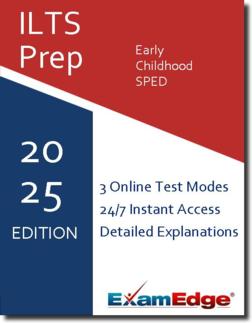ILTS Early Childhood Special Education (152) Practice Tests & Test Prep by Exam Edge - Additional Information
Based on 32 Reviews
- Real Exam Simulation: Timed questions and matching content build comfort for your ILTS Early Childhood SPED test day.
- Instant, 24/7 Access: Web-based ILTS Early Childhood Special Education practice exams with no software needed.
- Clear Explanations: Step-by-step answers and explanations for your ILTS exam to strengthen understanding.
- Boosted Confidence: Reduces anxiety and improves test-taking skills to ace your ILTS Early Childhood Special Education (152).

ILTS Early Childhood Special Education - Additional Information
ILTS Early Childhood Special Education (152)
The Illinois Licensure Testing System was created to help qualify new teachers for professional practice. Their exams are often required of new educators first starting their careers in Illinois. The ILTS 152 is just one of the many tests offered by this professional organization. It was specifically developed to measure the skills and knowledge of aspiring early childhood teachers who wish to focus on special education.
School districts frequently rely on scores from groups like the ILTS to decide which candidates to hire. A person's performance on the ILTS 152 can be a solid indicator of how successful they will be in the classroom.
What is the ILTS 152 like? What to Expect?
The ILTS 152 is a computer-based, multiple-choice exam. Over the course of a four-hour testing window, examinees must answer 125 questions in the hopes of earning a passing score of 240 points or more.
The ILTS 52 covers a wide range of foundational knowledge and skills that all early childhood educators should know. This includes everything from the development of individualized student programs to the management of social growth and student collaboration. As such, the ILTS 152 is a calculated measure of classroom knowledge and one's ability to implement it in an educational setting.
Anyone feeling unsure about their ability to pass this exam should consider adding ILTS 152 practice tests to their study routine. They're a surefire way to boost your score and build the confidence you need to pass on your first attempt.
Why is Taking the ILTS 152 Test Important?
Illinois teachers must take and pass the ILTS 152 if they hope to work with special education students in public elementary schools. It's a requirement for earning your teacher's license in Illinois.
While it's possible to work with private school students without first earning your license, taking and passing this exam will open up many more opportunities for teachers. Licensure sends a clear message to employers that you're both qualified and capable of a teaching position in Illinois public schools.
Of course, it's important to be prepared before registering for the exam. Not everyone can simply sign up and pass the test on their first try. By prioritizing ILTS special education practice exams in the weeks leading up to the test, you can ensure your very best performance on the actual exam.
How to Prepare for the ILTS 152 Exam?
There are several exam preparation strategies and tools to employ in the lead-up to your ILTS 152 test. Research shows that practice testing is one of the most effective uses of your time. By practicing with ILTS Early Childhood Special Education (152) questions, you'll train your brain to retrieve information quickly and consistently. Strengthening this mental muscle pays off in a big way on test day. If you haven't already done so, try taking an ILTS 152 practice test to gauge how you'd do if the exam were happening today.
With your results in hand, use the detailed answer explanations to craft the ultimate ILTS early childhood special education study guide. The practice test will reveal any content areas that warrant further attention and confirm which material you've already mastered. This allows you to create a study routine that's both effective and efficient.
Teachers are among the most well-respected professionals across the world. Don't let an exam get in the way of your dreams of becoming an educator. Get started with an ILTS 152 practice test now!


